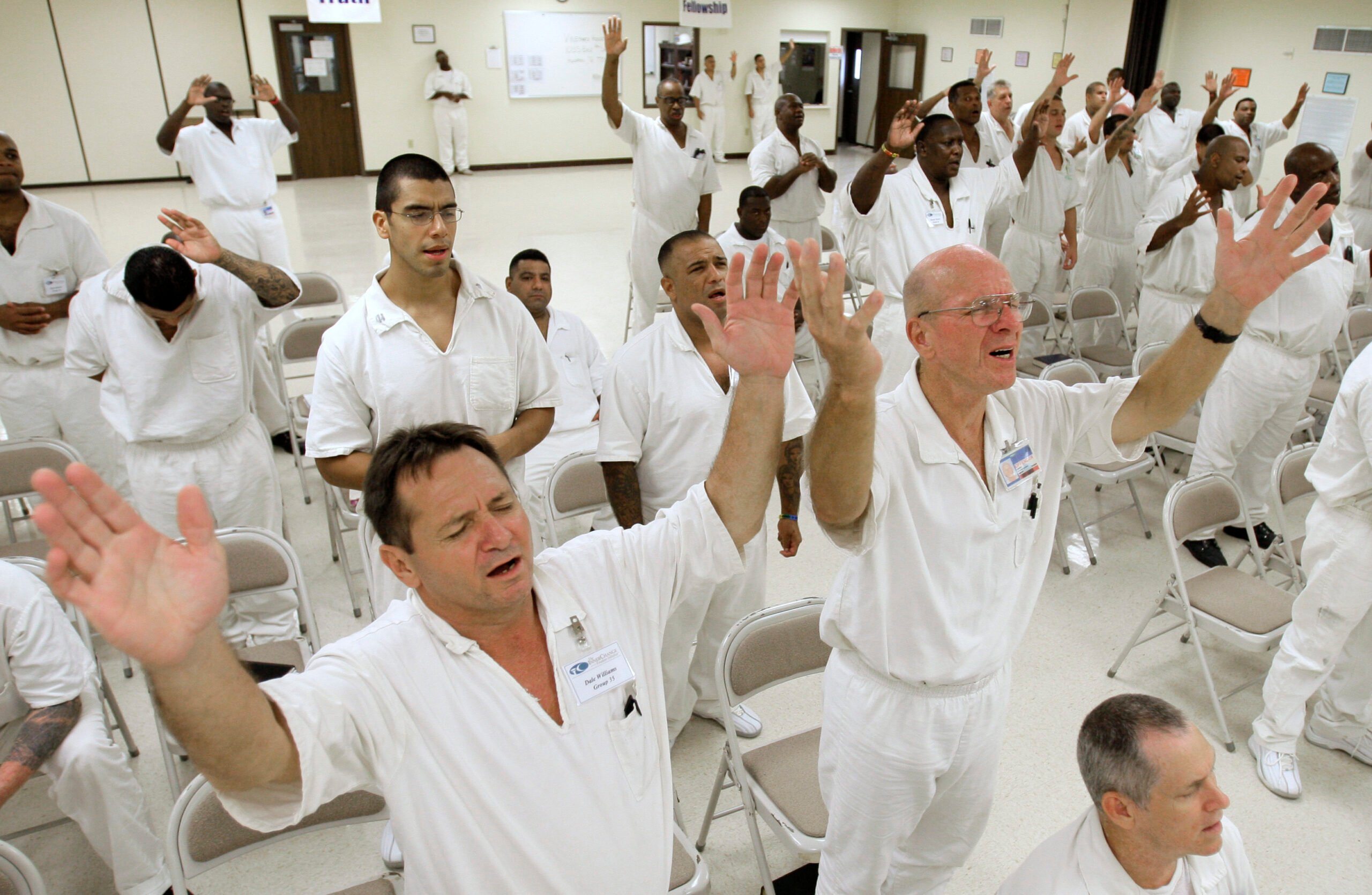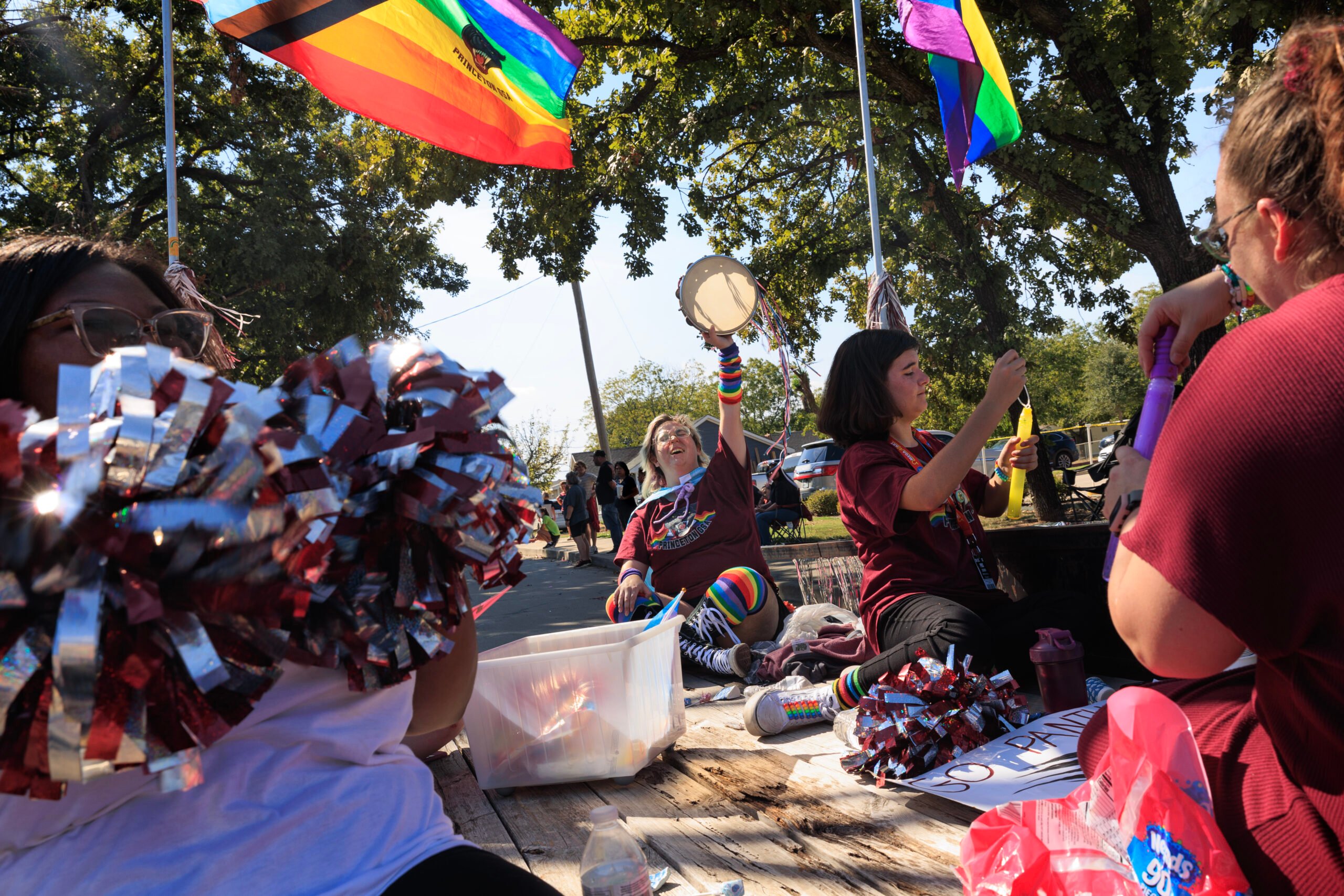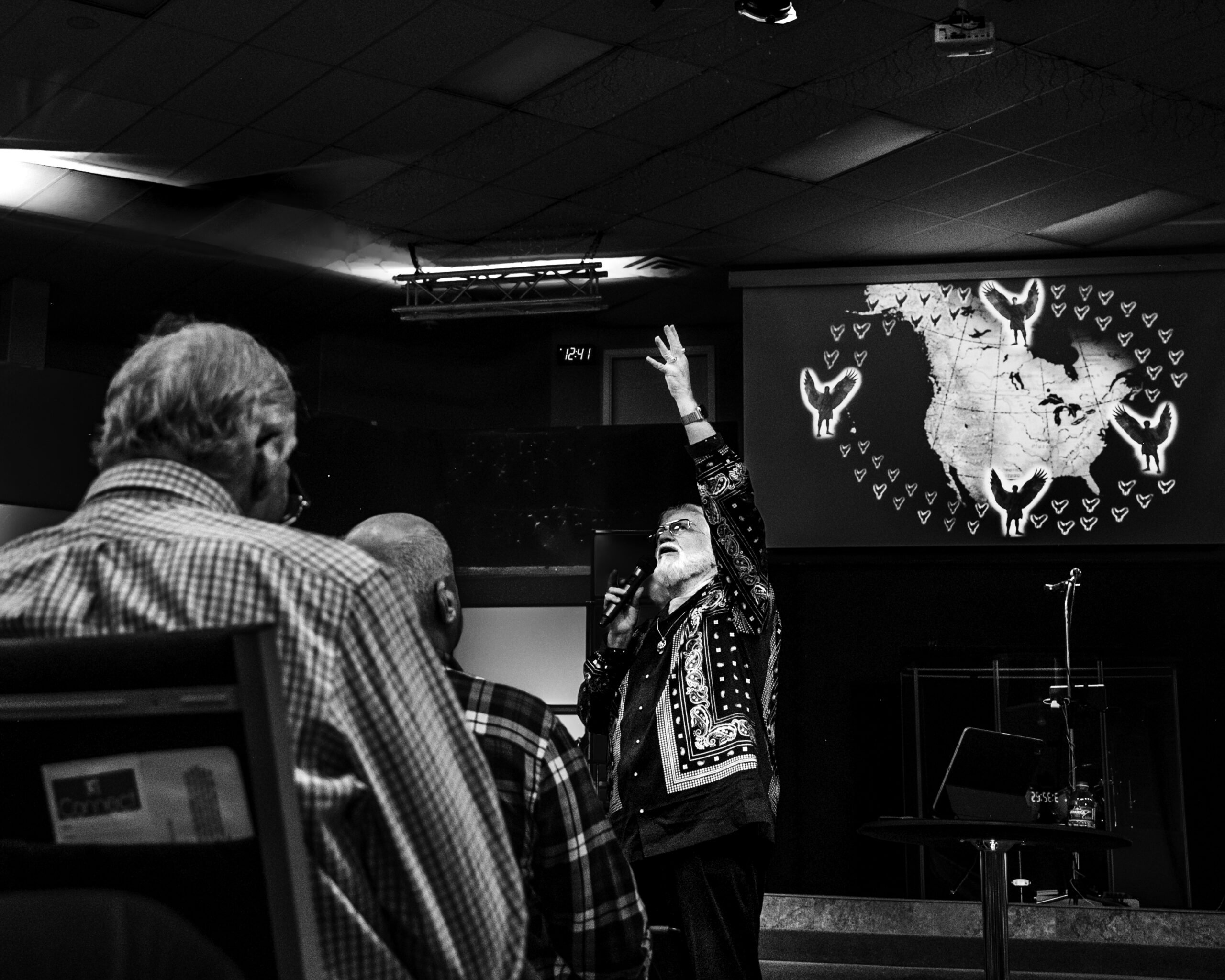
No Path to Redemption for Devout Death Row Inmates
Texas offers religious education to the condemned but rarely values spiritual growth when considering clemency requests.

Update, October 26, 2023: On October 26, the Texas Court of Criminal Appeals stayed Will Speer’s execution to allow the court to determine the merit of his lawyers’ claims that the state’s original case was flawed.
Every day at 6 a.m., Will Speer’s testimony is broadcast across the airwaves on the Polunsky Unit’s radio station. He talks to his fellow prisoners about redemption, salvation, and faith.
He is scheduled to be executed October 26.
Speer was convicted and sent to prison for the murder of his friend’s father when he was 16 years old. While incarcerated at the Telford Unit, he killed fellow prisoner Gary Dickerson in an attempt to gain membership to a prison gang. He was sentenced to death.
Now, as his lawyers and advocates seek clemency from Governor Greg Abbott and the Texas Board of Pardons and Paroles, Speer’s faith is central to their pleas. Speer is one of many on Texas’ death row who have asked for life in prison over the death penalty due to their spiritual devotion in prison—but the God-fearing state doesn’t typically grant clemency for that reason.
Speer, now 49, was one of 28 people chosen to participate in the inaugural class of the Faith Based Program on Death Row in December 2021. He was chosen after a “rigorous” application process for the program that consisted of several classes and immersive fellowship in a special housing area. Religious pleas for mercy are common in a place like Texas. The state’s own prison system offers faith-based programs as part of its rehabilitation department, pouring resources into classes dedicated to teaching remorse and redemption. The participants in these programs—and prison administration—laud them for creating second chances and leading to safer prison environments. But when it comes to the ultimate second chance—commuting an execution to life in prison—the people with power to grant clemency are not so moved.
Texas was the first state to offer such a religious fellowship program on death row, and according to the clemency application, the program “created a space for [Speer] to begin a meaningful spiritual journey.”
He graduated on June 7 and was tapped to become the first inmate coordinator of the program. His appointment was the popular choice among prison administration, as well as the men he would oversee in the role. He received his execution date just a month after being named coordinator.
Speer was moved to a separate housing area for those with upcoming execution dates, but he got special permission from the warden to continue working as coordinator—a job that would have him leave his heavily supervised housing area regularly. According to Speer’s clemency application, “this is a testament not only to the level of trust TDCJ [the Texas Department of Criminal Justice] has in Will—as no one with an execution date has previously been granted such freedom of movement—but also to Will’s sincere dedication to what he believes to be his mission: mentoring men who are as lost as he once was.”
Jedidiah Murphy’s execution earlier this month drew a fierce outpouring of support from his religious community before he was put to death, with his lawyers and other allies insisting that his faith had changed him. On October 10, as he was preparing to receive a lethal injection, his final words were a recitation of Psalm 34: “The Lord redeems the soul of his servants, and none of those who trust in him shall be condemned.”
In June of 2022, Speer was baptized at the Polunsky Unit. The event was attended by TDCJ Field Ministers, as well as Polunsky’s then-warden Daniel Dickerson. At this point, Will had completed six months of his religious education in the faith-based program on death row. After his baptism, he was “declared a new man.”
Now, as the Board of Pardons and Paroles weighs whether to commute Speer’s sentence, Texans will get a glimpse into whether the state’s promised paths to rehabilitation and salvation lead anywhere.
Clemency, with its connotation of mercy and compassion, is entirely subjective—often a black-box decision made by an executive or an administrative body. But it’s also a critical tool for preventing miscarriages of justice. The U.S. Supreme Court said in 1987 that a death penalty system without “discretionary acts of leniency would be totally alien to our notions of criminal justice.”
Clemency processes have always existed at the federal and state level. Granting clemency can look like a pardon, which undoes a criminal conviction, or a commutation, which lessens a sentence. According to Michael Heise, author of the 2003 report on the death penalty “Mercy by the Numbers,” “the constitutional Framers viewed pardons as a public act of office rather than a private act of grace.”
That sentiment still exists to a certain extent today: Clemency decisions are affected by the political leaning of the president or governor and whether it’s an election year.
“Clemencies in death penalty cases are difficult to predict and immune from judicial review.”
“Thus the process may be highly political,” the Death Penalty Information Center wrote. “For these reasons, clemencies in death penalty cases are difficult to predict and immune from judicial review.”
The clemency process lies totally outside of the court system. In Texas, the Board of Pardons and Paroles—a body made up of gubernatorial appointees—decides whether to recommend clemency to the governor, who has ultimate authority to accept or deny the recommendation. But the governor can only recommend clemency if the board agrees.
In death row cases, clemency holds a special significance: It’s the last available option to forestall an execution after all appeals have been exhausted. Overall, clemencies are rarely granted in capital cases (an average of less than two per year nationwide, according to the Death Penalty Information Center).
Texas’ clemency process has a blotchy permanent record. In 1999, Amnesty International declared that, because of issues of secrecy and a lack of training of board members, “Texas has turned the final safeguard of executive clemency into nothing more than an empty gesture.”
This declaration came just one year after one of the most well-known religious-based clemency appeals in Texas history failed.
In 1998, the Washington Post referred to Karla Faye Tucker as “the Pickax Killer turned born-again Christian.” Tucker, who was sentenced to death after murdering Jerry Lynn Dean and Deborah Thornton in Houston in a drug-fueled frenzy in 1983, gained international notoriety for her dramatic religious conversion while on death row.
“Texas has turned the final safeguard of executive clemency into nothing more than an empty gesture.”
In the weeks leading up to her execution date in February of 1998, Pope John Paul II even appealed for mercy in her case. But the pardons board declined her application for clemency. Then-Governor George W. Bush would have had the power to grant her a 30 day stay of execution, but he refused, saying “May God bless Karla Faye Tucker and may God bless her victims and their families.”
Tucker became the first woman executed in Texas since the Civil War.
A contemporary account in Texas Monthly summed up the inherent friction between the death penalty and religious appeals for clemency: “The many around the world who protested believed that Tucker had been redeemed and that her life should be spared, but that belief has no standing in a courtroom.”
Religious appeals for clemency aren’t unusual, but they’re not the majority of cases either, says Mark Osler, professor at St. Thomas School of Law and renowned clemency and legal scholar.
“In clemency work, if we have a good case, often we’re talking about someone who’s changed their life in some way,” he told the Texas Observer. “Because of the nature of faith, often that does have to do with a religion they’ve either adopted or reembraced.”
But even if someone has changed their life, there’s almost no way to change their sentence.
Osler wrote the book Jesus on Death Row to explore the legal processes behind Jesus’ crucifixion in the Bible. In doing so, he hoped to speak directly to devout Christians who support the death penalty, despite there being “a wrongful conviction right there at the center” of the religion.
“People don’t put the two things in juxtaposition. They don’t hold them together,” he said. “They don’t think about Holy Week when they think about executions. They don’t think about the Eucharist when they think about the last meal of a condemned person.”
In Texas, only three men have ever been granted clemency from a death sentence by the governor: Thomas Whitaker in 2018, Kenneth Foster in 2007, and Henry Lee Lucas in 1998. (Other death row prisoners have had their sentences commuted because of U.S. Supreme Court rulings or other external circumstances.)
Clemency requests can focus on innocence claims—as in Lucas’ case—or the supposed unfair application of the law. In Foster’s case, he was sentenced to death after a botched robbery ended in a murder, but he was just the getaway driver. In Whitaker’s case, his lawyers appealed to the more discretionary aspect of the clemency process.
In 2003, Whitaker was involved in a plot to kill his mother, father, and 19-year-old brother for inheritance money. Then 23, he conspired with his roommate, Chris Brashear, who ambushed the family at their home one night. Brashear shot and killed Whitaker’s mother and brother, but his father, Kent Whitaker, survived the attack.
Kent Whitaker, a devout Christian, would spend the next 15 years pleading for his only remaining son’s life.
Whitaker’s attorney Keith Hampton focused not on the religious ideals of the man on death row, but appealed to the Christian sensibilities of his father and the board members.
“My view of clemency is that it’s sort of the moral fail-safe where the courts have gotten it wrong, or the courts can’t do anything to provide justice,” Hampton told the Observer. Hampton, who has represented two of the three men who have received discretionary clemency in Texas history, said the most successful appeals have an emotional core.
He said because the pardons board has read all about the crime that landed the person on death row, they’re “a tough audience.”
“The only way to reach them is an upfront, honest, verifiable appeal to mercy,” he said.
“The only way to reach them is an upfront, honest, verifiable appeal to mercy.”
In the clemency application, he summarized the biblical story of Cain and Abel, the ill-fated sons of Adam and Eve. Cain kills Abel, the story goes. While the Bible doesn’t go into specifics, the application notes that Eve “did not cry out for his execution as God’s answer to her grief.” God goes on to mark Cain “for his crime, as well as for Cain’s own protection” and sends him to “restlessly wander the world.”
“Commutation means that we as a society do not forgive or execute [Whitaker],” the clemency application states. “We will instead mark him to wander his own mind within the desolation of his own cell. And this punishment will continue until God decides otherwise.”
Whitaker was scheduled to be executed on February 22, 2018. In an exceedingly rare event, the Board of Pardons and Paroles voted unanimously to grant Whitaker clemency. Governor Abbott agreed.
Will Speer actually submitted a testimonial in favor of Whitaker’s clemency. “Of all the people I have met over the years Thomas Whitaker is the person I believe deserves clemency the most,” he wrote to the board. “He is one of the best liked inmates on this farm by the guards and other inmates, and he has worked the hardest to rehabilitate himself.”
Per Speer’s own clemency application, his goal, if granted clemency, would be to become a field minister. To do so, he would complete a four-year bachelor of arts in applied ministry through the prison system’s education program. It’s one of the many faith-based rehabilitation programs offered by TDCJ.
In 1997, Gary Dickerson’s sister was a witness in the sentencing phase for Speer’s capital murder trial. Recently, she spoke out in support of clemency.
“In my heart, I feel that he is not only remorseful for his actions but has been doing good works for others and has something left to offer the world,” she said in a public appeal. “After all I have learned about Mr. Speer, I respectfully request that his sentence be changed to life in prison where hopefully he can continue to help others and make amends for his past crimes.”



